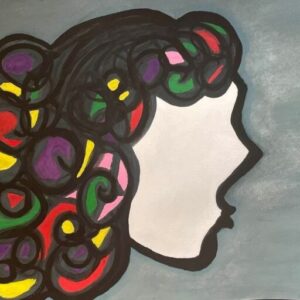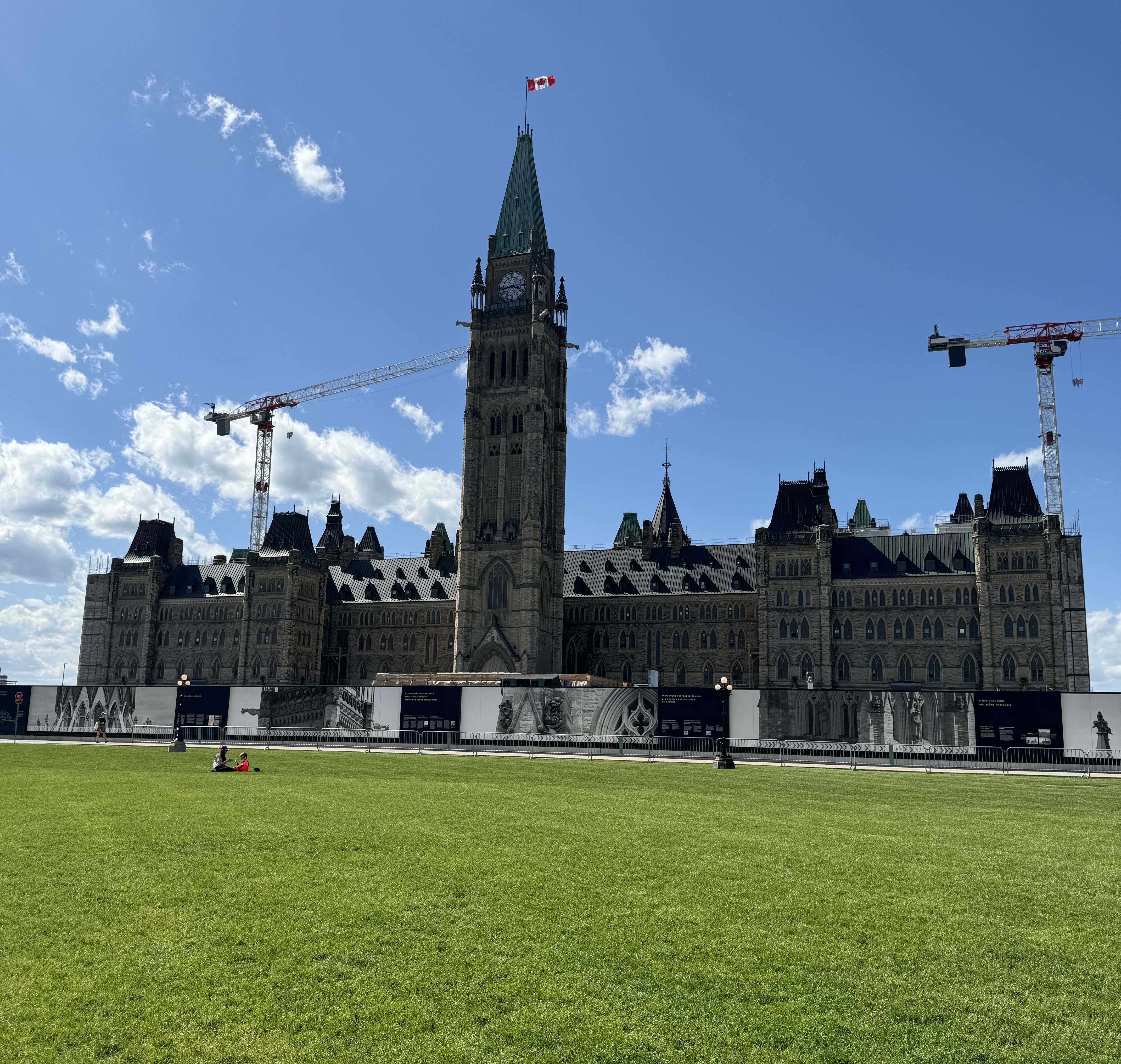In recent months, I’ve compiled a collection of memoirs exploring the immigrant experience, encompassing themes of immigration, integration, identity, and belonging. From diverse voices, I’ve listed 16 books, arranged chronologically by year of publication from most recent to oldest, providing invaluable insights into the memories, imaginations, and lived experiences of displacement and resettlement. Whether broadening your knowledge or seeking compelling narratives, these books offer a profound exploration of the immigrant journey, straight from the authors’ hearts.
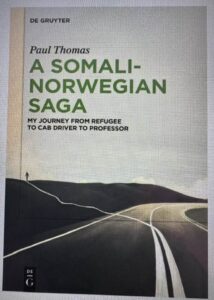
1. A Somali-Norwegian Saga: My Journey from Refugee to Cab Driver to Professor (2024)
Author: Paul Thomas
In a poignant memoir spanning over three decades, the author traces his remarkable journey from refugee to cab driver and eventually to the esteemed realm of academia as a professor in Norway. Amidst the backdrop of societal and political discourse surrounding refugees and non-western minorities, often steeped in misconceptions and biases, this memoir offers a rare and authentic voice from the subaltern, inspired by the postcolonial tradition of challenging dominant narratives. Through a blend of personal reflections and critical analysis, the author provides a nuanced perspective on the challenges and triumphs faced by people of color, shedding light on the complexities of integration and identity formation.
Beyond its personal narrative, “A Somali-Norwegian Saga: My Journey from Refugee to Cab Driver to Professor” serves as a candid and unreserved guide for marginalized youth navigating the labyrinth of societal expectations and systemic barriers. Intertwining sociological theories with lived experiences, the memoir advocates for the recognition and accommodation of diverse hybrid identities in an increasingly “browning” Western demographic. It grapples with the conflicts arising from cultural practices at odds with universal democratic ideals while offering a message of hope and resilience, celebrating the countless refugees who have overcome adversity to enrich and diversify Norwegian society.
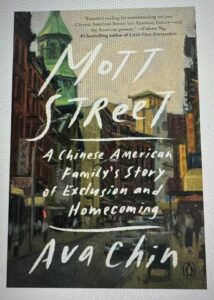
2. Mott Street: A Chinese American Family’s Story of Exclusion and Homecoming (2024)
Author: Ava Chin
Growing up as the only child of a single mother in Queens, Ava Chin grappled with the enigma of her family’s origins, particularly the absence of her father and the conflicting narratives surrounding her heritage. “Mott Street” chronicles Chin’s relentless pursuit to unravel the mysteries of her Chinese American lineage, spanning decades of meticulous research that ultimately leads her to not only discover her father but also a pivotal building that served as a sanctuary for her family.
Delving into the shadows of history, Chin confronts the legacy of the Chinese Exclusion Act of 1882, a landmark legislation that barred Chinese immigrants from citizenship for over six decades. Through vivid storytelling, she retraces the footsteps of her pioneering ancestors who braved the treacherous journey from the Pearl River Delta to the American West in the mid-nineteenth century. From their labor on the transcontinental railroad to their resilience in the face of systemic racism, Chin unveils the untold stories of her family’s struggles and triumphs, particularly in New York City’s Chinatown, where a single building on Mott Street emerges as a poignant symbol of their resilience and resilience against exclusionary policies. “Mott Street” is a compelling testament to the enduring legacy of exclusion and resilience that continues to shape the American experience, offering profound insights into the intricate tapestry of identity, belonging, and resistance.
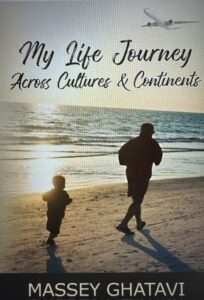
3. My Life Journey Across Cultures & Continents (2023)
Author: Massey Ghatavi
Embark on an intimate journey through the pages of this poignant narrative, tracing the footsteps of a young teenager who ventured far from his homeland before reaching the age of 16. Massey’s story is a tapestry woven with threads of hardship, love, and triumph, inviting readers to explore the depths of his soul as he navigates the complexities of identity and cultural adaptation across continents. Through his introspective reflections, Massey paints a vivid portrait of the immigrant experience, revealing the resilience and fortitude required to carve a path in unfamiliar terrain.
Beyond the mere chronicle of relocation, Massey’s narrative serves as a beacon of inspiration and guidance for readers embarking on their own journeys of self-discovery and achievement. From self-taught language proficiency to academic excellence and entrepreneurial endeavors, his story embodies the essence of perseverance and the pursuit of one’s dreams. With each turn of the page, readers are not only transported into Massey’s world but also equipped with invaluable insights on resilience, cultural assimilation, and the pursuit of fulfillment in an ever-changing landscape.
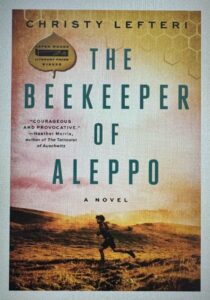
4. The Beekeeper of Aleppo (2020)
Author: Christy Lefteri
Recipient of the ASPEN WORDS LITERARY PRIZE and a FINALIST FOR THE DAYTON LITERARY PEACE PRIZE, The Beekeeper of Aleppo unveils the lives of Nuri, a beekeeper, and his wife Afra, an artist, as they embrace the tranquil rhythms of their existence in Aleppo, Syria. Yet, their idyllic world crumbles beneath the weight of war’s devastation, propelling them on a harrowing odyssey across Turkey and Greece, with Britain as their elusive sanctuary.
Nuri shoulders the burden of guiding Afra, who has lost her sight along with their shattered homeland, through the tumultuous journey. Amidst the wreckage of their past, they cling to the hope of reuniting with Nuri’s cousin, Mustafa, who has forged a new life in Yorkshire, England, teaching refugee communities the art of beekeeping. As they navigate perilous terrain and confront the abyss of their own loss, their quest for reunion becomes a poignant metaphor for resilience and the enduring power of love amidst displacement. The Beekeeper of Aleppo is a poignant testament to the fragility of peace and the indomitable human spirit, offering a searing portrayal of lives irrevocably transformed by the ravages of conflict.
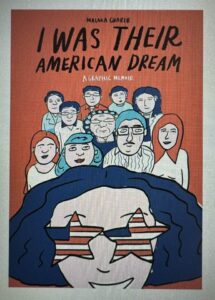
5. I Was Their American Dream (2019)
Author: Malaka Gharib
Winner of the Arab American Book Award and celebrated as one of NPR’s and The New York Public Library’s finest reads of the year, “I Was Their American Dream” intricately weaves a compelling coming-of-age tale with a profound exploration of the immigrant experience in the United States. Through the lens of her own upbringing, Malaka Gharib delves into the intricate dance between her Filipino and Egyptian heritage and the pressures of assimilation into white American culture. From navigating familial expectations to grappling with societal norms, Malaka’s journey is a poignant reflection of the trials and triumphs encountered by countless immigrants striving for a better life in America.
In this triumphant graphic memoir, Malaka brings to life the vibrant tapestry of her teenage years while offering insightful commentary on the challenges of identity and belonging in a multicultural society. Through her candid storytelling and heartfelt illustrations, she sheds light on the nuanced experiences of modern immigrants and the complexities of the millennial generation they have raised. “I Was Their American Dream” serves as both a personal homage to her immigrant roots and a universal ode to the resilience and hope embodied by those who dare to pursue the American dream.
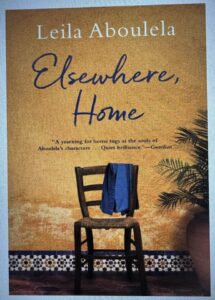
6. Elsewhere, Home (2018)
Author: Leila Aboulela
Leila Aboulela’s “Elsewhere, Home” offers a captivating exploration of the immigrant experience, delving into the complexities of assimilation and identity in unfamiliar lands. Through a series of poignant narratives, Aboulela paints a vivid picture of life abroad, juxtaposing the dusty, sun-baked streets of Khartoum with the university halls and cramped apartments of Aberdeen and London.
The collection chronicles the lives of various characters grappling with the profound emotions of yearning, loss, and alienation that come with leaving one’s homeland in pursuit of a new life. From a young woman confronted with painful reminders of her past in Khartoum to a wealthy Sudanese student forming an unlikely friendship in Aberdeen and seeking a sense of home in London, each story intertwines themes of cultural conflict and self-discovery with subtlety and restraint. “Elsewhere, Home” invites readers to navigate the intricate terrain of immigrant experiences, offering a poignant reflection on the universal human desire for belonging and connection amidst the challenges of displacement.
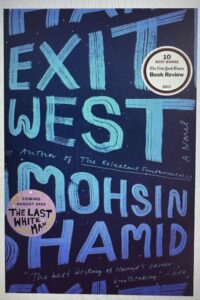
7. Exit West (2018)
Author: Mohsin Hamid
Exit West by Mohsin Hamid delves into a world where doors serve as portals to distant corners of the globe. Through the lens of protagonists Saeed and Nadia, fleeing the turmoil of civil war, the novel explores the varied responses they encounter—from nativist violence to reluctant acceptance—as they traverse new lands. Mohsin Hamid, celebrated for works like The Reluctant Fundamentalist, crafts a riveting narrative that earned acclaim as one of the New York Times’ 10 Best Books of 2017 and a finalist for the Man Booker Prize in 2017.
Set against the backdrop of a nation engulfed in conflict, Exit West unfolds as a poignant love story between Nadia, fiercely independent, and Saeed, quietly steadfast. Their clandestine romance flourishes amidst the chaos until unrest violently fractures their city. Faced with whispers of doors offering escape, the duo decides to abandon their homeland, embarking on a journey into the unknown. Through these portals, they emerge into a future fraught with uncertainty, grappling with their identities and their enduring bond amidst the challenges of displacement. Profoundly intimate and strikingly inventive, Exit West is a timeless testament to love, resilience, and the human spirit in the face of upheaval.
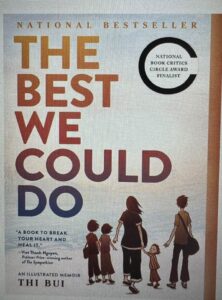
8. The Best We Could Do (2018)
Author: Thi Bui
A recipient of both national acclaim as a bestseller and the prestigious American Book Award, “The Best We Could Do” by debut author Thi Bui stands as an intimate and deeply moving graphic novel recounting her family’s harrowing journey from war-torn Vietnam. Through captivating illustrations and poignant prose, Bui masterfully captures the tumultuous upheavals of immigration and the profound impact of displacement on both a child and her family.
Against the backdrop of Vietnam’s fall in the 1970s, Bui courageously depicts her family’s daring escape and their arduous quest to forge new lives in unfamiliar lands. At its core, the narrative delves into the universal struggle of parenthood, as Bui grapples with the challenges of motherhood while navigating her own identity and heritage. Through hauntingly poetic storytelling and breathtaking artwork, Bui explores themes of familial strength, the quest for belonging, and the intricate tapestry of love that binds generations together, offering a poignant meditation on the essence of home and the enduring resilience of the human spirit.
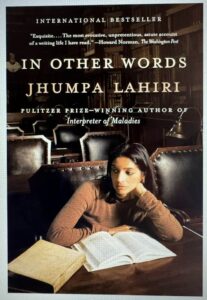
9. In Other Words (2017)
Author: Jhumpa Lahiri
From the acclaimed author and Pulitzer Prize winner comes a compelling departure into nonfiction—a poignant exploration of self-discovery through language. Kirkus Reviews praises it as “a sincere, captivating journey of a writer navigating her identity through words.” In “Tongues Untold,” the narrative unfolds as a tale of ardor—a prolonged courtship with a language that borders on obsession. For Jhumpa Lahiri, this infatuation blossomed in the streets of Florence, post-college. Italian’s allure was immediate, but despite years of study, Lahiri felt distant from mastery.
Yearning for full immersion, she relocates to Rome with her family, viewing it as a baptism into both language and culture. There, Lahiri embarks on a journey of reading and writing, beginning with entries in her journal, exclusively in Italian. “Tongues Untold,” written autobiographically in Italian, delves into the complexities of self-expression in a foreign tongue, charting a writer’s quest for a new voice. Presented bilingually, this work is a distinctive exploration of exile—linguistic and existential—crafted with the clarity and intensity reminiscent of Vladimir Nabokov. It stands as a bold testament to introspection and a profound inquiry into identity and renewal.
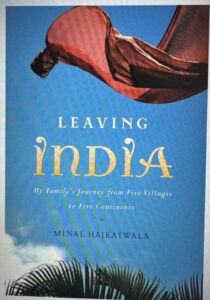
10. Leaving India: My Family’s Journey from Five Villages to Five Continents (2009)
Author: Minal Hajratwala
Recipient of the prestigious PEN Award, “Leaving India” offers an intimate exploration of the Indian diaspora through the captivating stories of the author’s own family. Minal Hajratwala skillfully blends memoir, history, and investigative journalism to unravel the intricate journey of her ancestors, shedding light on the profound intersections of choice and historical circumstances that propelled them from India to distant shores.
From her great-grandfather’s courageous flight from British-occupied India to Fiji, where he forged a path from humble beginnings to entrepreneurial success, to the far-reaching dispersion of her family across continents and countries, Hajratwala paints a vivid portrait of the diasporic experience. Against the backdrop of pivotal historical events such as British colonialism, apartheid, Gandhi’s salt march, and American immigration policy, she uncovers the complex dynamics that shaped her family’s trajectory, offering a poignant reflection on the universal themes of sacrifice, resilience, and the quest for identity in the face of profound change. “Leaving India” stands as a meticulously researched and deeply evocative testament to the enduring legacy of the Indian diaspora and the enduring human spirit.
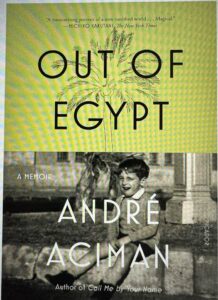
11. Out of Egypt (2007)
Author: Andre Aciman
In a vibrant and captivating memoir, André Aciman paints a vivid portrait of his flamboyant Jewish family, tracing their journey from the bustling cosmopolitan hub of Alexandria to their eventual exodus three generations later. Through elegant and witty prose, Aciman introduces readers to a cast of marvelous eccentrics who have left an indelible mark on his life, from the audacious Uncle Vili to the gossiping grandmothers who converse fluently in six languages.
Against the backdrop of a now-vanished world, Aciman delves into the intricate tapestry of his family’s history, rooted in Italian and Turkish heritage, yet firmly intertwined with the vibrant tapestry of Egyptian life. Through the lens of his own coming-of-age, Aciman navigates the joys and tribulations of his family’s daily existence, from weekly outings to the movies to heated debates over religion and money. As he tenderly reminisces about the city he once called home, Aciman crafts a mesmerizing narrative that captures the emotional complexities of exile and the enduring allure of nostalgia. With lucid and lyrical prose reminiscent of literary giants like García Márquez and Chekhov, Aciman invites readers on an unforgettable journey into the heart of a bygone era.
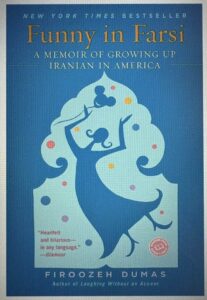
12. Funny in Farsi: A Memoir of Growing Up Iranian in America (2004)
Author: Firoozeh Dumas
In “Funny in Farsi” by Firoozeh Dumas, readers are taken on a journey alongside young Firoozeh and her family as they make the transition from Iran to America in the 1970s. Firoozeh quickly adapts to her new environment, becoming her family’s de facto interpreter and integrating seamlessly into American school life. Through a series of humorous anecdotes, the memoir showcases the endearing quirks of Firoozeh’s family, particularly her father Kazem, whose infectious enthusiasm for American culture serves as a source of lighthearted amusement.
As Firoozeh matures, she grapples with the complexities of straddling dual identities and navigating societal perceptions as an Iranian American. Despite encountering challenges such as stereotypes and xenophobia, Firoozeh’s resilience and humor shine through, offering readers a relatable portrayal of the immigrant experience. The memoir concludes with Firoozeh’s poignant return to Iran as an adult, where she reflects on the evolution of her identity and the enduring bonds that transcend geographical borders.
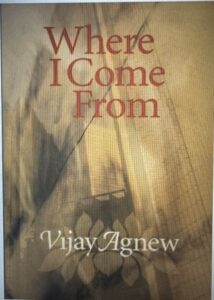
13. Where I Come From (2003)
Author: Vijay Agnew
When asked, ‘Where do you come from?’ upon immigrating to Canada, Vijay Agnew initially considered it a straightforward inquiry, responding with her place of birth and upbringing. However, as time passed, she discovered that this seemingly innocuous question often carried undertones of otherness, particularly for individuals with different skin colors, suggesting a lack of belonging in Canadian society. This realization spurred Agnew to delve deeper into the implications of the question and its answers, culminating in her reflective memoir, ‘Where I Come From.’
The book chronicles Agnew’s experiences as an immigrant professor in a Canadian university from 1967 to the present, spanning the period when Canada began welcoming third-world immigrants. Through her narrative, Agnew explores the social construction of identity by examining the various labels attached to her over three decades in Canada, such as “foreign student,” “Indian woman,” “immigrant,” “Indian feminist,” and “third-world woman.” She elucidates how each label influenced her relationships and contributed to shaping her identity as a feminist, anti-racist, activist professor. Agnew’s multilayered account unveils the intricate intersections of race, class, and gender in the life of an immigrant woman, fostering a dialogue that bridges differences and underscores shared human experiences.
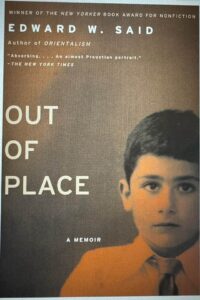
14. Out of Place: A Memoir (1999)
Author: Edward Said
“Out of Place” by Edward Said is a poignant memoir that traces the author’s journey through displacement, identity, and cultural navigation. Born into a wealthy Palestinian family, Said’s childhood is marked by frequent relocations due to political upheaval, shaping his understanding of self and society. His narrative weaves through Palestine, Egypt, and the United States, exploring the tension between his Arab heritage and Western upbringing. Said’s introspective reflections offer profound insights into the complexities of cultural belonging, as he grapples with the challenges of being an outsider in multiple worlds.
Beyond his personal story, Said provides astute commentary on broader political and social issues, drawing on his experiences as a Palestinian living in exile. Through eloquent prose, he examines the impacts of imperialism, colonialism, and nationalism on the Middle East and beyond. “Out of Place” invites readers to confront their own assumptions about identity and power dynamics, offering a compelling exploration of the human experience in a world shaped by cultural diversity and political turmoil. Said’s memoir is not only a testament to his personal journey but also a powerful reflection on the universal quest for belonging and understanding in an ever-changing world.
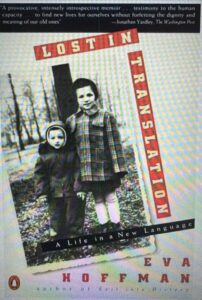
15. Lost in Translation: A Life in a New Language (1990)
Author: Eva Hoffman
In 1959, at the age of thirteen, Eva Hoffman’s life took a seismic shift as she bid farewell to her war-torn hometown of Cracow and embarked on a new chapter in the serene suburbs of Vancouver. Navigating the tumultuous waters of adolescence in a foreign land, Eva grappled with the weight of nostalgia and the challenge of mastering a new language.
Her journey continued through the corridors of academia and into the bustling literary scene of New York City, yet she remained tethered between two worlds. As she observed the shifting landscapes of American society, Eva’s perspective evolved, offering poignant reflections on the complexities of cultural assimilation and the enduring quest for self-translation. “Lost in Translation” emerges as a poignant testament to resilience and adaptation, inviting readers to ponder the profound influence of culture on identity and the timeless pursuit of self-discovery.
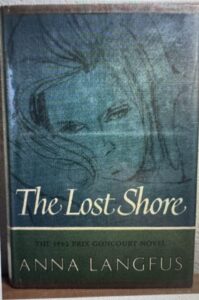
16. The Lost Shore (1964)
Author: Anna Langfus
In Anna Langfus’s The Lost Shore [Les Bagages de Sable], Maria, a Polish-Jewish refugee, stands as a haunting embodiment of survival in the wake of the Holocaust, echoing the author’s own narrative. Stranded in France, Maria confronts a world indifferent to her suffering, where even her own family pressures her into silence regarding her harrowing past.
Amidst this desolation, Maria finds a fleeting refuge in the company of an older man, whisking her away to the southern shores of France. Yet, her journey towards semblance of normalcy is fraught with internal turmoil, as she grapples with the weight of her memories and the numbing effect of loss. Langfus navigates Maria’s existential crisis, probing into her doubts about the sincerity of her relationships and her struggle to find purpose in a world that seems intent on erasing her pain. The novel paints a poignant portrait of resilience amidst profound despair, offering a testament to the enduring human spirit in the face of unfathomable tragedy.


